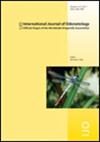Odonata species diversity, distributions, and status in a rare sand prairie-savanna wetscape
IF 1
4区 农林科学
Q3 ENTOMOLOGY
引用次数: 0
Abstract
Inland sand areas scattered across the North American eastern deciduous forest and western tallgrass prairie ecotone are known for supporting pyrogenic early-successional vegetation and specially adapted terrestrial faunas. Many of these globally and regionally rare systems contain functionally connected wetland networks (“wetscapes”) potentially important for aquatic insects. Sampling adults, nymphs, and exuviae in a remnant sand prairie-savanna wetscape in Illinois, USA, I assessed odonate species diversity (alpha, gamma, beta), distributions (spatial, temporal, abundance), and rarity status. In one field season (12 sites, 12 visits) I found more than a third of Illinois odonate species and close to half of the state’s lentic breeding odonates, including a new state record (Erythemis vesiculosa). Richness averaged 25.8 species per site, reducing to 12.4 species with removal of nonbreeding occurrences. Three sites including a shrub swamp, beaver pond, and forested vernal depressions complex made significant contributions to beta diversity, dependent on general versus breeding occurrences. Majorities of Anisoptera species (70%) and Zygoptera species (53%) bred at three or fewer sites. Eight species flew during all or most of the study period (late May to early October) whereas 14 species were detected on a single survey. Status classification derived from the observed spatial, temporal, and abundance distributions resulted in 24 common or very common species, 20 uncommon or rare species, and 10 vagrants across the wetscape. These context-specific classifications may be combined with diversity and breeding patterns and other information in wetscape prioritization schemes.罕见的沙草原稀树草原湿地中的蜻蜓物种多样性、分布和地位
分布在北美东部落叶林和西部牛脂草原交错带的内陆沙区以支持热原早期演替植被和特别适应的陆地动物群而闻名。这些全球和地区罕见的系统中有许多包含功能连接的湿地网络(“湿地景观”),对水生昆虫来说可能很重要。在美国伊利诺伊州一片残留的沙草原稀树草原湿地中,我对成虫、若虫和蜕皮动物进行了采样,评估了齿形动物的物种多样性(α、γ、β)、分布(空间、时间、丰度)和稀有性。在一个野外季节(12个地点,12次访问)中,我发现了超过三分之一的伊利诺伊州齿形石物种和该州近一半的慢繁殖齿形石,其中包括一个新的州记录(泡状红斑藻)。每个地点的丰富度平均为25.8种,随着非繁殖现象的消除,减少到12.4种。包括灌木沼泽、海狸池和森林覆盖的春季洼地综合体在内的三个地点对β多样性做出了重大贡献,这取决于一般情况与繁殖情况。主要的Anisoptera物种(70%)和Zygoptera物种(53%)在三个或更少的地点繁殖。在整个或大部分研究期间(5月底至10月初),有8个物种飞行,而在一次调查中发现了14个物种。根据观察到的空间、时间和丰度分布进行的状态分类产生了24个常见或非常常见的物种,20个不常见或罕见的物种,以及10个流浪者。这些特定于环境的分类可以与多样性和繁殖模式以及湿地景观优先方案中的其他信息相结合。
本文章由计算机程序翻译,如有差异,请以英文原文为准。
求助全文
约1分钟内获得全文
求助全文
来源期刊

International Journal of Odonatology
ENTOMOLOGY-
CiteScore
2.30
自引率
0.00%
发文量
15
审稿时长
>12 weeks
期刊介绍:
International Journal of Odonatology (IJO) is aimed at providing a publication outlet for the growing number of students of Odonata. It will address subjects such as the ecology, ethology, physiology, genetics, taxonomy, phylogeny and geographic distribution of species. Reviews will be by invitation, but authors who plan to write a review on a subject of interest to the journal are encouraged to contact the editor.
 求助内容:
求助内容: 应助结果提醒方式:
应助结果提醒方式:


